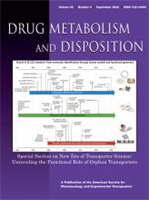
Membrane transporters play a major role in human physiology and in drug disposition and response. However, substrates and/or functions of many members in the solute carrier (SLC) superfamily are still not known. Therefore, de-orphaning these SLC proteins becomes a matter of great importance in understanding the impact of genetic variants in these transporters on disease development and drug responses, and the functional consequences of their gene regulation.
The current DMD special section on “New Era of Transporter Science: Unraveling the Functional Role of Orphan Transporters” includes six featured review articles contributed by Dr. Kathleen M. Giacomini at the University of California, San Francisco and her formal trainees, which highlight the cutting-edge researches on emerging roles of the human SLC 22 family, the regulatory sciences of studying transporter interactions, the role and application of transporters in disposition, tumor targeting and tissue toxicity of nuclear medicinal diagnostic reagents lobenguane and mIBG.
In addition, the special section also includes comprehensive reviews on SLC1 and SLC7 transporters in inflammation and immune responses, the epigenetic and nuclear receptor-mediated transcriptional regulation, and the impact of inflammation and infection on transporters in the placenta. These articles outline the recent advancement of de-orphaning research on SLC transporters, their gene regulation, and their impact on drug disposition.
All content in the special section on “New Era of Transporter Science: Unraveling the Functional Role of Orphan Transporters” found in Drug Metabolism and Disposition September 2022 (50/9) issue is freely accessible through March 2023.